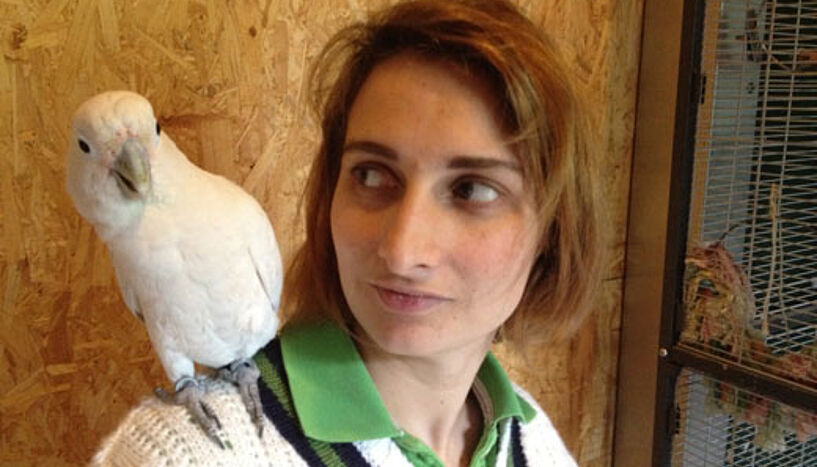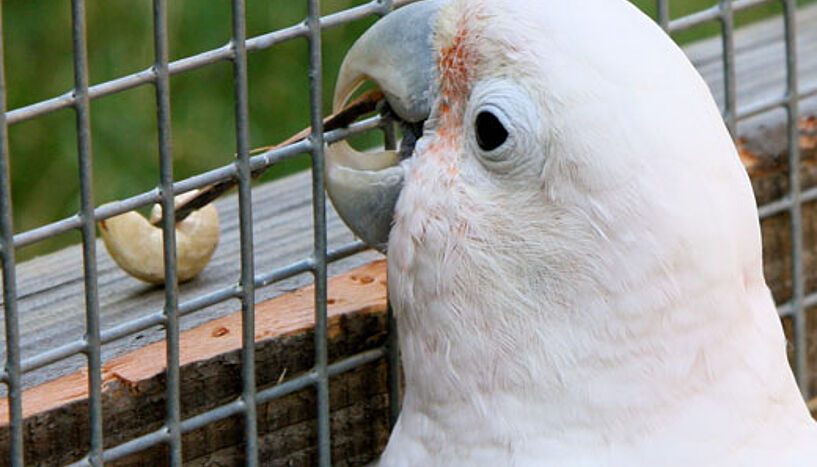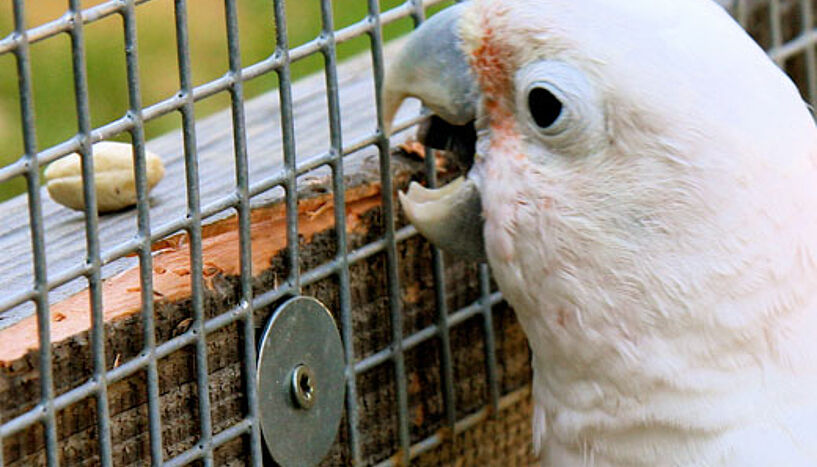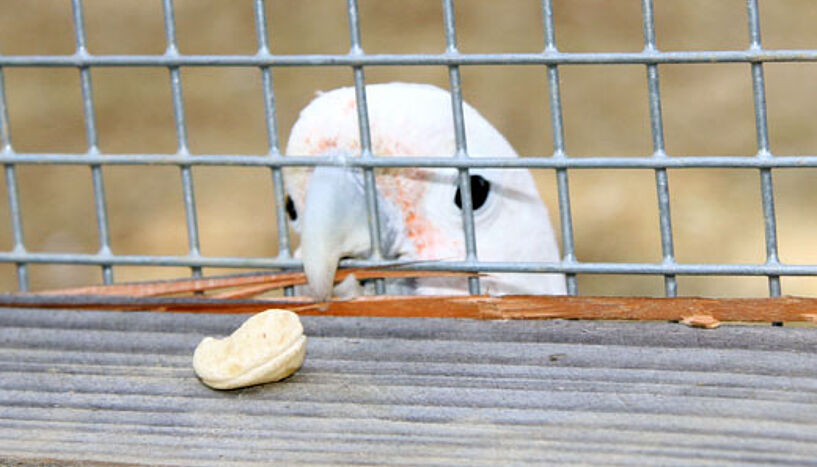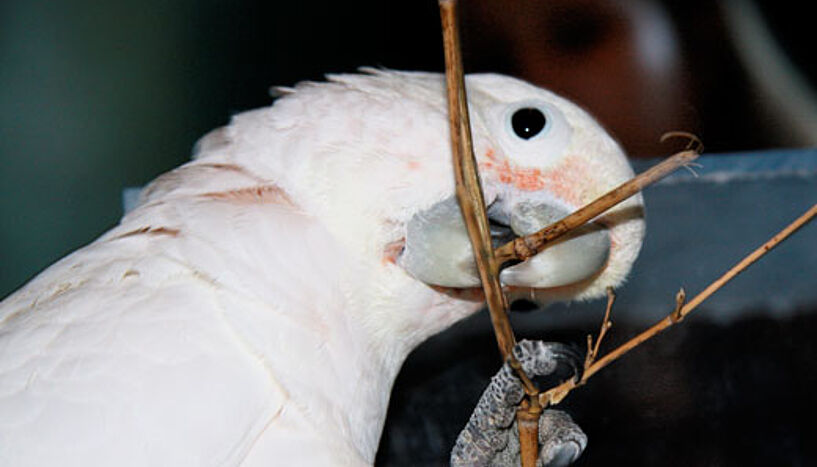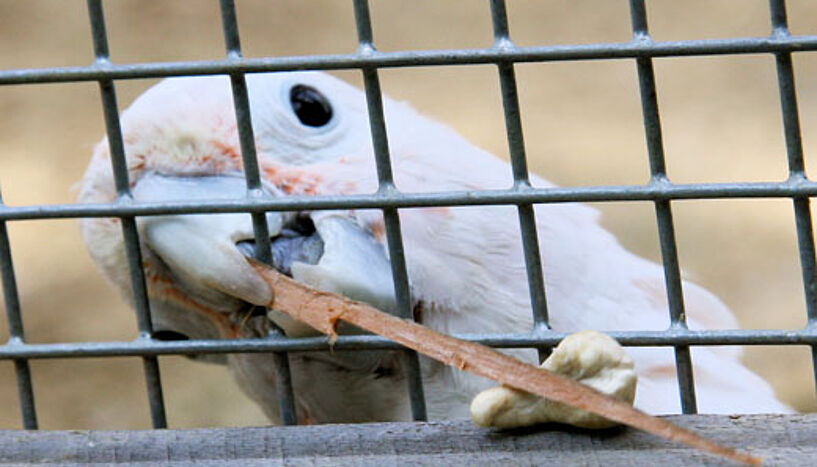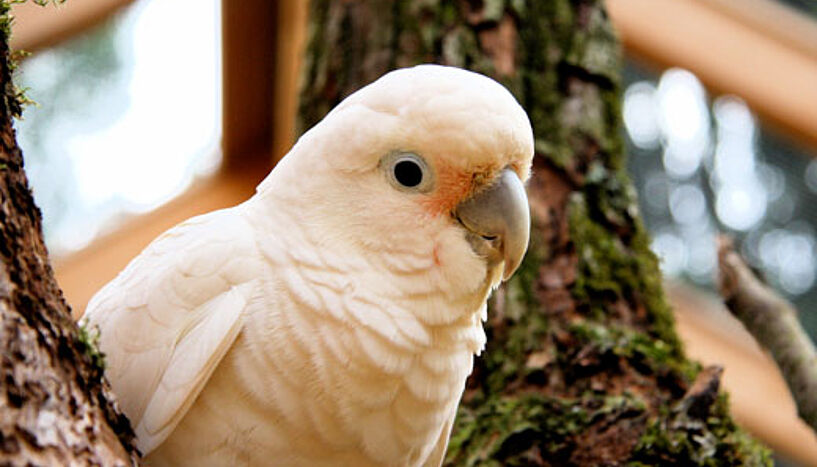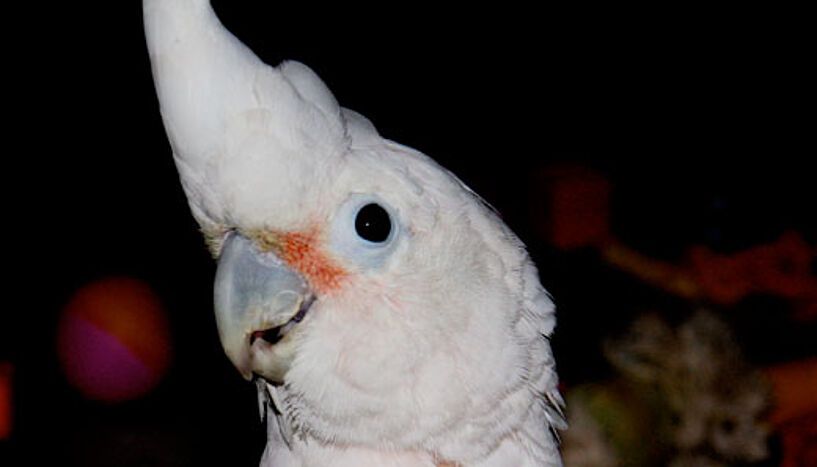Clever cockatoo with skilled craftmanship
06. November 2012The use and fashioning of objects as tools has rarely been seen in the animal kingdom. Alice Auersperg and Birgit Szabo, both cognitive biologists at the University of Vienna, have for the first time observed this skill in a Goffin's Cockatoo: It makes and uses wooden tools to retrieve toys and food. The results, presently published in the journal "Current Biology", are filling a part of the puzzle in the development of intelligent behaviour.
Goffin's cockatoos are a highly playful and curious Indonesian cockatoo species. Therefore, cognitive biologists are now using them as a model species to investigate intelligent behaviour in birds. Together with researchers from the University of Oxford, Alice Auersperg and Birgit Szabo from the Department of Cognitive Biology at the University of Vienna have made a sensational discovery: "We were able to film the cockatoo 'Figaro' using its powerful beak to cut long splinters out of wooden beams or breaking off and modifying a side arm of a branch, to rake in a nut that was out of its direct reach", explains Alice Auersperg, who led the study.
The right tool for every nut
For the researchers it came as a surprise that Figaro used a tool at all, and more so, that the he made it by himself. The most important observation was that the cockatoo, after having managed to fashion his first tool, knew what to do without hesitation in further experiments. "Figaro made a new tool for every nut we placed there and each time the bird was successful in obtaining it", reports the cognitive biologist. Goffin's cockatoos are highly explorative known to be good problem solvers in technical areas, and large-brained. However, they are unlikely to be habitual tool users in the wild. "Until now Figaro is the only one in his species in which we could observe this behaviour so far", Birgit Szabo says. His feat demonstrates that tool craftsmanship can emerge from non-specialized intelligence.
Evolution of intelligence
"It is still difficult to identify cognitive operations. Figaro, and his predecessor Betty, may help us unlock many unknowns in the evolution of intelligence", Alex Kacelnik, professor at the University of Oxford, explains. He is one of the authors of the study and was also involved in another study about the famous New Caledonian crow Betty: She surprised experts by fashioning hooks out of wire, to fish food out of a pipe. Even though this species uses tools in the wild, there was no precedent of this form of tool making, and the case is still considered to be a striking example of individual creativity and innovation.
"For a long time such talents have only been attributed to our closest relatives, the great apes. Since then, however, tool use has been reported in capuchin monkeys, some birds and even some invertebrates", Alice Auersperg explains. While the tool-using club is admitting new members, scientists are still puzzling over the roles of intelligence, culture and ecology in promoting and supporting such competences.
Publication in Current Biology:
Alice Auersperg, Birgit Szabo, Auguste von Bayern, Alex Kacelnik: Spontaneous innovation in tool manufacture and use in a Goffin’s cockatoo in Current Biology, November 6, 2012.
DOI: 10.1016/j.cub.2012.09.002
Scientific Contact:
Dr. Alice Auersperg
Department of Cognitive Biology
University of Vienna
1090 Vienna, Althanstraße 14
M +43-676-939 03 92
alice.auersperg(at)univie.ac.at
Prof. Dr. Alex Kacelnik
Behavioural Ecology Research Group
University of Oxford
T +44-1865-271164
alex.kacelnik(at)zoo.ox.ac.uk
Press contact:
Alexandra Frey
Press Office of the University of Vienna
Research and teaching
1010 Vienna, Universitätsring 1
T +43-1-4277-175 33
M +43-664-602 77-175 33
alexandra.frey(at)univie.ac.at
Wissenschaftlicher Kontakt
Dr. Alice Auersperg
Head of Goffin Lab – Messerli ForschungsinstitutVeterinärmedizinische Universität Wien
, 1210 - Wien, Veterinärplatz 1
+43-676-939 03 92
alice.auersperg@vetmeduni.ac.at
Rückfragehinweis
Mag. Alexandra Frey
Media Relations ManagerUniversität Wien
1010 - Wien, Universitätsring 1
+43-1-4277-17533
+43-664-8175675
alexandra.frey@univie.ac.at
Downloads:
Alice_Auersperg_02.jpg
Dateigröße: 2,31 MB
Figaro_holt_Nuss_02.JPG
Dateigröße: 813,72 KB
Figaro_Holzbalken_02.JPG
Dateigröße: 995,67 KB
Figaro_macht_Werkzeug_02.JPG
Dateigröße: 2,2 MB
Figaro_Nuss_02.JPG
Dateigröße: 1,68 MB
Figaro_Werkzeug_02.JPG
Dateigröße: 1,03 MB
Goffini_02.JPG
Dateigröße: 1,19 MB
Goffini_2_02.JPG
Dateigröße: 3,57 MB

